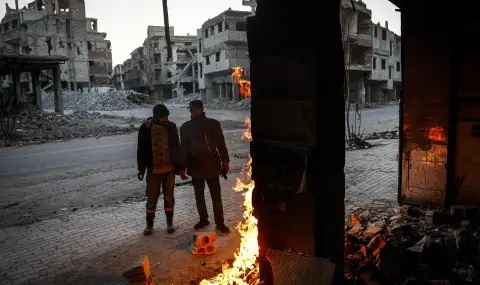The incursion of Israeli forces into Syria after the fall of Bashar al-Assad's regime has raised some questions. At first, Israeli Prime Minister Benjamin Netanyahu said it was a temporary measure to ensure the security of his country's border with Syria. Last week, however, Netanyahu visited the occupied Golan Heights. "We will stay until there is another solution that ensures the security of Israel”.
However, a new Syrian government will not be in place until at least March 2025. Concerns that Israel's seizure of Syrian territory is not just a temporary security measure have intensified after it became known that the country will invest in infrastructure in the Golan Heights. Israel wants to double the population of the region it occupied during the 1967 Six-Day War - half of the people living there are Israeli Jews, the other half are Druze, who identify as Syrians despite having Israeli citizenship.
The UN, the European Union and most other countries consider the Golan Heights to be Syrian territory illegally occupied by Israel. In 2019, then-and-future US president Donald Trump recognized the region as part of Israel. The territory occupied in recent days is part of the UN-controlled demilitarized buffer zone that separates the Golan Heights from Syria. The leader of the Hayat Tahrir al-Sham (HTS) group, Ahmad al-Sharaa, also known by his rebel name Abu Muhammad al-Jolani, condemned Israel's actions but also said that Syria was not seeking military conflict with its neighbor.
Temporary measure or occupation?
Observers and analysts are now asking whether Israel is trying to expand its territory, create a new buffer zone under its control - following the example of the one in Lebanon and the planned one on the Gaza border, or simply temporarily protect itself. Until recently, Israel was worried that Syria was helping Iran transfer weapons to Hezbollah in Lebanon. Now observers say that this practice has stopped. Iran and Hezbollah fought on Assad's side against HTS, so their relations are unlikely to be good.
Yossi Mekelberg, a Middle East expert at the British think tank "Chatham House", believes that the key word in this situation is "temporary". "Temporary that becomes permanent means occupation. And occupation usually leads to resistance and not very good neighborly relations," he says. According to him, Israel's security concerns are also not to be ignored. "Israel needs to secure its borders, but not through occupation or military aggression," Mekelberg believes. If instead UN forces remain in the region, the situation will stabilize, the expert says.
Will this affect relations with Arab countries?
Arab countries have condemned Israel's actions. The official position of the Saudi Foreign Ministry is that the Golan Heights are occupied Syrian territory and Syria's sovereignty and territorial integrity must be respected. ”Israel's entry into Syria and the creation of a buffer zone is not considered justified in any way by Arab countries,” said Sanam Wakil, director of the Middle East and North Africa program at ”Chatham House”. According to her, Israel does not understand that these actions limit the prospects for a larger normalization of relations with other countries in the Middle East.
Israel normalized its bilateral relations with several Arab countries such as Sudan, the UAE and Morocco during the first term of Donald Trump, who will return to the White House in January. Negotiations between Israel and Saudi Arabia - the most influential Arab state and home to the holy mosques in Mecca and Medina for Muslims - were suspended after the terrorist attack by Hamas against Israel on October 7 and the subsequent war in the Middle East.
However, the director of the London-based risk analysis company "International Interest” Samdi Hamdi does not believe that the seizure of Syrian land - no matter how temporary or not - will hinder the possibility of normalization of relations between Israel and Saudi Arabia. According to the expert, Syria's sovereignty will not be on the table at all. "Riyadh's demands remain the same - a NATO-style defense agreement with the US from Iran, support for the country's economic reforms included in the so-called "Vision 2030", and access to nuclear technology," says Hamdi. "It is important to emphasize that even the creation of an independent Palestinian state is not a key factor in the process of normalization between Israel and Saudi Arabia".
Author: Jennifer Hollis
